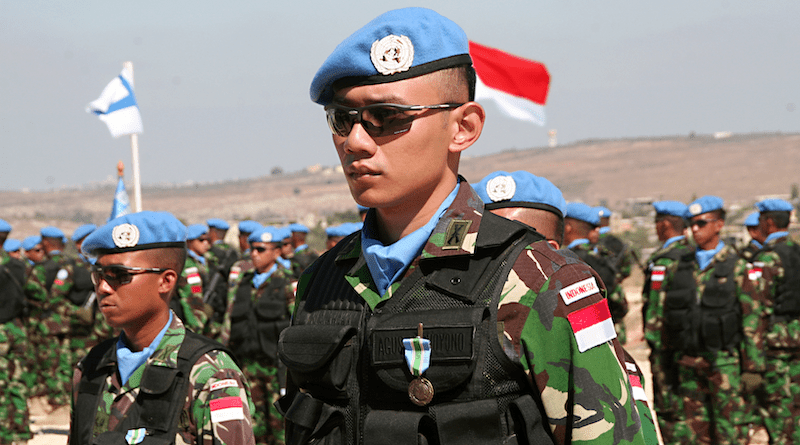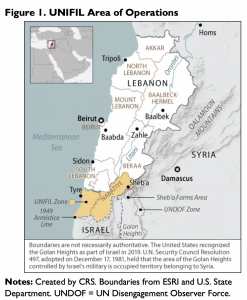United Nations Interim Force In Lebanon (UNIFIL) – Analysis
By CRS
By Carla E. Humud*
The United Nations Interim Force in Lebanon (UNIFIL) has been deployed in the Lebanon-Israel-Syria triborder area since 1978. The mission was deployed following the 1978 Israeli invasion of southern Lebanon targeting the Palestine Liberation Organization (PLO), which used Lebanon as a base to wage a guerilla war against Israel.
Israel maintained a self-declared security zone in southern Lebanon until 2000, and the formal boundaries in the triborder area remain disputed. The United States has supported UNIFIL with the aim of bolstering the authority of the Lebanese Armed Forces (LAF) in UNIFIL’s operating area (see Figure 1) in southern Lebanon, a region historically dominated by Hezbollah.
Evolution of UNIFIL Mandate
UNIFIL’s initial mandate was to confirm the withdrawal of Israeli forces from southern Lebanon, restore peace and security, and assist the Lebanese government in restoring its authority in southern Lebanon (a traditionally Shi’a area that became a Hezbollah stronghold in the 1980s). Israel withdrew its forces from southern Lebanon in 2000. The United Nations subsequently identified a 120 km interim boundary line between Lebanon and Israel to use as a reference for confirming the withdrawal of Israeli forces. The Line of Withdrawal, commonly known as the Blue Line, is not an international border demarcation between the two states. It incorporates elements of the 1949 Armistice Line and French Mandate-era administrative boundaries between Syria and Lebanon.
After Israel and Hezbollah fought a 34-day war in 2006, U.N. Security Council Resolution (UNSCR) 1701 (2006) increased UNIFIL’s troop ceiling and expanded its mandate to include monitoring the cessation of hostilities between the two sides, accompanying and supporting the LAF as they deployed throughout southern Lebanon. UNSCR 1701 authorized UNIFIL to assist the Lebanese government in the establishment of “an area free of any armed personnel, assets and weapons other than those of the Government of Lebanon and of UNIFIL” between the Blue Line and the Litani River, which UNIFIL defines as its area of operations. UNSCR 1701 also calls upon the government of Lebanon to secure its borders and asks UNIFIL “to assist the Government of Lebanon at its request.”
Implementation of UNSCR 1701
According to UNIFIL, “Any unauthorized crossing of the Blue Line by land or by air from any side constitutes a violation of Security Council resolution 1701.” UNIFIL monitors violations of UNSCR 1701, and the U.N. Secretary-General reports regularly to the U.N. Security Council on the implementation of UNSCR 1701. These reports have listed violations by Hezbollah, such as the construction of underground tunnels that cross beneath the Blue Line, as well as violations by Israel, such as regular incursions into Lebanese airspace.
Size and Structure
UNIFIL is headquartered in the Lebanese town of Naqoura, 14 miles south of Tyre. Its leadership rotates among troop- contributing states; since February 2022 UNIFIL has been led by General Aroldo Lázaro Sáenz (Spain). As of August 2022, UNIFIL deploys approximately 9,900 troops from 48 countries in a 1060 square km zone roughly a third the size of Rhode Island. The largest troop contributing countries are Indonesia, Italy, India, Ghana, and Nepal. (U.S. forces do not participate in UNIFIL). UNIFIL’s mandate falls under Chapter VI of the U.N. Charter, which allows for the use of force primarily in self-defense, rather than Chapter VII, which would enable enforcement by military means. Since 1978, UNIFIL has reported 325 fatalities. Three- quarters of these occurred prior to 2000.
Maritime Task Force. UNIFIL’s Maritime Task Force (MTF) operates along the entire length of the Lebanese coastline and assists the Lebanese Navy in preventing the entry of unauthorized arms or other materials to Lebanon. Led by Germany, the force comprises five vessels (one each from Bangladesh, Germany, Greece, Indonesia, and Turkey.) In December 2022, Germany initiated the provisional handover of the Maritime Interdiction Operations Command from UNIFIL to the Lebanese Navy. UNIFIL stated that this would “eventually enable the Lebanese Navy, for the first time in 16 years, to take control of maritime monitoring and interdiction operations … Moving forward, an assessment period will evaluate and determine when … the LAF Navy will be ready to take over this vital role.”
Debates over UNIFIL and U.S. Policy
U.S. Administrations have disagreed over the mission and size of UNIFIL. In 2020, former U.S. Ambassador to Lebanon Jeffrey Feltman described UNIFIL as a stabilizing presence in southern Lebanon, stating that Hezbollah strikes across the Blue Line have significantly decreased since UNSCR 1701 (2006) increased UNIFIL’s troop ceiling from 2,000 to 15,000. Feltman stated, “UNIFIL’s value in constraining Hezbollah comes down to its size. Through sheer numbers, it essentially saturates the south. Even if it can evade UNIFIL scrutiny at times, as the tunnels show, Hezbollah does not have the almost complete freedom of movement in the south that it enjoyed under ‘old’ UNIFIL.”
The Obama Administration, while recognizing UNIFIL’s limitations, generally did not seek to change the force’s mandate. In 2009, Susan Rice, then-U.S. Permanent Representative to the United Nations, testified that “UNIFIL is currently limited to a Chapter 6 mandate … The strengthening of the mandate is an interest that I understand many good people on the Hill share. We certainly are sympathetic to it, but I don’t think as a practical matter than we will be able to muster the support in the Security Council that would be necessary to substantially strengthen the mandate … We, frankly, think that … on balance the role that UNIFIL is playing adds value rather than the opposite, even as we wish it would be able to do more.”
The Trump Administration, however, asserted that UNIFIL “patrols and checkpoints are of plainly limited use when offending parties can simply hide weapons and tunnel entrances on so-called ‘private property.’” U.S. and Israeli officials accused Hezbollah of hiding weapons in violation of UNSCR 1701, and pushed for the addition of language to UNIFIL’s mandate that would allow UNIFIL to access and search private property for Hezbollah weapons. Trump Administration officials criticized Lebanon’s government for not facilitating UNIFIL access to key sites, such as the Lebanese origin points of Hezbollah’s underground tunnels.
In response to U.S. pressure, the Security Council added provisions to annual resolutions reauthorizing UNIFIL’s mandate. In 2017, U.S. officials successfully advocated for language requiring UNIFIL to notify the Security Council whenever it encountered roadblocks or other obstacles; these incidents are now noted in U.N. Secretary-General reports on the implementation of UNSCR 1701. In 2019, the Security Council approved U.S.-proposed language calling for the Secretary-General to assess the effectiveness of UNIFIL; the resulting report highlighted structural weaknesses. In 2020 the Security Council reduced UNIFIL’s maximum force strength from 15,000 to 13,000 troops. Then-U.S. Ambassador to the United Nations Kelly Craft stated, “The reduction of the ceiling from 15,000 troops to 13,000 is an important step toward right-sizing a mission that has for years been over-resourced given the limits on its freedom of movement and access.”
The Biden Administration’s FY2023 budget request states that UNIFIL’s “most effective functions, including its liaison mechanism and patrols along the Blue Line, will provide value even as Hizballah impedes the mission’s freedom of movement and restricts access, preventing full implementation of UNIFIL’s mandate.” The August 2022 resolution reauthorizing UNIFIL’s mandate (UNSCR 2650) reiterated that, per the 1995 status of forces agreement between Lebanon and the United Nations, “UNIFIL does not require prior authorization or permission to undertake its mandated tasks and … is authorized to conduct its operation independently.”
The language reportedly is intended to counter what UNIFIL has described as“misinformation” among some residents that UNIFIL is not authorized to patrol without the presence of the LAF. A 2020 U.N. Secretary-General assessment of UNIFIL (S/2020/473) stated that in some instances, the local population hindered UNIFIL patrols unless they were accompanied by the LAF. Hezbollah leader Hassan Nasrallah described the resolution as a “violation of Lebanese sovereignty.” UNSCR 2650 also extended for an additional six months a provision contained in UNSCR 2591 (2021) authorizing UNIFIL to take “temporary and special measures” to assist the LAF by providing food, fuel, medicine, and logistical support.
2022 Death of UNIFIL Peacekeeper
On December 14, 2022, an Irish soldier serving with UNIFIL died when a convoy of two armored vehicles carrying eight personnel to Beirut came under “small arms fire,” according to the Irish Defense Forces. The incident occurred in the village of al Aaqbiya, just south of Sidon (see Figure 1), when a “crowd attacked” the vehicle he was traveling in, according to Ireland’s Foreign Affairs and Defense Minister. Details of the incident remain unclear, and are being separately investigated by UNIFIL, Ireland, and Lebanon. Hezbollah denied involvement in what it described as an “unintentional incident.”
Issues for Congress
U.S. Funding. The United States provides assessed funding to UNIFIL through the Contributions for International Peacekeeping Activities (CIPA) account in annual State/Foreign Operations appropriations bills. For FY2023, the estimated U.S. UNIFIL assessment is $143 million. The current U.S. peacekeeping assessment (including for UNIFIL) is 26.94%. Since the mid-1990s, Congress has capped U.S. peacekeeping payments at 25%, leading to the accumulation of U.S. arrears (about $1 billion since FY2017). The Administration’s FY2023 budget request includes $730.3 million for cap-related arrears payments.
UNIFIL Mandate. FY2022 legislation directed the Administration to brief the Committees on Appropriations “prior to future negotiations on the extension of UNIFIL’s mandate.” In late 2022, UNIFIL reported that it has “yet to gain full access to several locations of interest,” including Green Without Borders sites, tunnels crossing the Blue Line, and firing ranges outside of state control. Members may consider whether the Administration should seek to have the UNSC limit, expand, or otherwise alter UNIFIL’s mandate to increase effectiveness.
*About the author: Carla E. Humud, Analyst in Middle Eastern Affairs
Source: This article was published by the Congressional Research Service (CRS)


